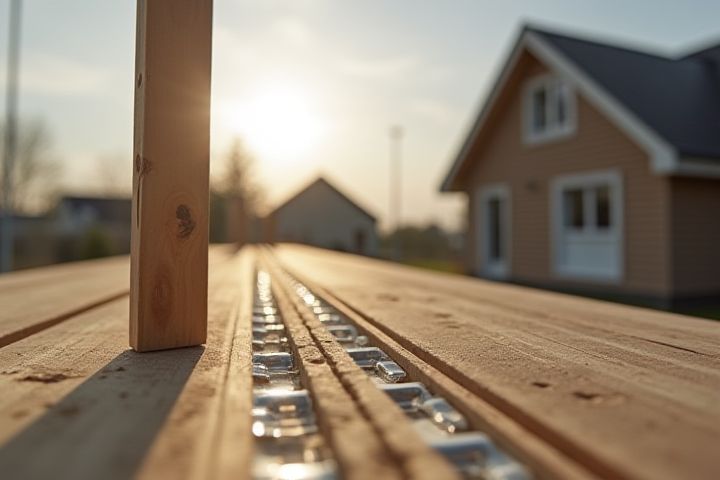
Investing in a house renovation can significantly enhance property value, making it a smart financial decision for homeowners. Upgrades such as kitchen remodels, bathroom extensions, and energy-efficient installations often yield high return on investment (ROI). Renovations also provide an opportunity to create a personalized living space that meets your lifestyle needs and preferences. Furthermore, improved aesthetics and functionality can increase market appeal, attracting potential buyers and speeding up sales in a competitive real estate market. By investing in quality materials and craftsmanship, you can ensure that your renovations stand the test of time, contributing to long-term satisfaction and value.
Why Invest In A House Renovation
Increase property value
Investing in a house renovation can significantly increase property value, often yielding a return on investment (ROI) of 70% to 80% for well-executed upgrades. Key areas to focus on include kitchen remodels, which can add around $20,000 to $50,000 to your home's worth, and bathroom renovations, typically returning $15,000 to $30,000. Enhancements such as energy-efficient windows or modern roofing can also appeal to buyers and can result in lower utility costs, making your property more attractive. By prioritizing renovations that appeal to current market trends, you can maximize your property's resale potential while enjoying the immediate benefits of an upgraded living space.
Enhance curb appeal
Enhancing curb appeal through house renovation can increase your property's value by up to 20%, making it a smart financial decision. Updates such as fresh paint, landscaping, and new siding can create a stunning first impression, attracting potential buyers quickly. A well-maintained exterior also suggests that the interior is equally cared for, encouraging a higher selling price during a sale. Investing in these improvements not only boosts aesthetic appeal but also enhances your home's marketability in a competitive real estate landscape.
Energy efficiency improvements
Investing in house renovations focused on energy efficiency improvements can yield substantial long-term savings on utility bills, with an average homeowner saving between 10% to 30% on energy costs annually. Upgrading insulation materials, installing energy-efficient windows, and incorporating smart home technologies can enhance your home's energy performance while increasing its market value by approximately 5% to 15%. Additionally, energy-efficient upgrades often qualify for tax credits and rebates, providing immediate financial incentives to reduce your investment costs. Prioritizing these improvements not only contributes to environmental sustainability but also creates a more comfortable living space, ensuring a return on investment that benefits both your wallet and the planet.
Modernize outdated spaces
Investing in house renovation to modernize outdated spaces significantly enhances property value and appeal, making it a lucrative decision for homeowners. By updating kitchens and bathrooms with contemporary fixtures and energy-efficient appliances, you not only improve functionality but also attract potential buyers. Open floor plans and modern finishes elevate aesthetics, creating a welcoming atmosphere that reflects current design trends. Your investment can yield substantial returns while providing you with a comfortable and stylish living environment.
Personal customization
Investing in a house renovation allows for personal customization that enhances both comfort and functionality. By tailoring your living space to your unique preferences, you can improve the overall aesthetic and increase property value, with renovations averaging a 70% return on investment. Incorporating features such as open floor plans, energy-efficient appliances, or upgraded materials can significantly elevate your home's appeal. Personalizing your environment not only creates a more satisfying living experience but also reflects your individual style and lifestyle needs.
Address safety issues
Addressing safety issues in a house renovation can significantly enhance your property's value and livability. Approximately 75% of homes built before 1978 contain lead-based paint, necessitating proper lead abatement to protect your health. Electrical upgrades, such as replacing outdated wiring, can reduce fire hazards, with faulty wiring being the cause of nearly 50,000 house fires each year. Investing in renovations that prioritize safety can lead to lower insurance premiums and provide peace of mind for you and your family.
Improve functionality
Investing in house renovation can significantly enhance functionality, particularly by optimizing space utilization and modernizing essential systems. A well-planned kitchen remodel, for instance, can improve cooking efficiency, while upgrading bathrooms can boost comfort and accessibility. Implementing open floor plans allows for better flow of movement, making daily tasks easier and more enjoyable. According to the National Association of Realtors, 75% of homeowners feel a sense of accomplishment after completing a renovation, demonstrating the impact of improved functionality on overall satisfaction.
Increase resale potential
Investing in house renovations can significantly increase your property's resale potential by up to 20%. Data shows that kitchen remodels often yield the highest return on investment, averaging around 80% recouped costs. Bathrooms are another critical area, with modern updates potentially enhancing value by as much as 70%. Enhancing curb appeal, such as through landscaping or exterior improvements, can also attract buyers and contribute to a quicker sale at a higher price point.
Tax benefits
Investing in a house renovation can yield significant tax benefits, as homeowners are often eligible for deductions on mortgage interest, property taxes, and certain improvement costs. For 2023, homeowners can deduct up to $10,000 for state and local taxes, which may include property taxes associated with renovations. Moreover, energy-efficient improvements may qualify for federal tax credits, saving you up to 30% on eligible expenses. If you decide to sell your renovated home, the increased property value can potentially result in a capital gains exclusion of up to $250,000 for single filers--$500,000 for married couples filing jointly--depending on your ownership and use of the property.
Trend adaptation
Investing in a house renovation to adapt to current trends can significantly enhance your property's market value by as much as 10-20%. Modernizing elements like open floor plans and energy-efficient fixtures cater to the preferences of today's homebuyers. Incorporating smart home technology not only increases convenience but also boosts appeal in a competitive market. By staying updated with trends, you ensure that your home remains desirable, potentially minimizing time on the market when you decide to sell.
